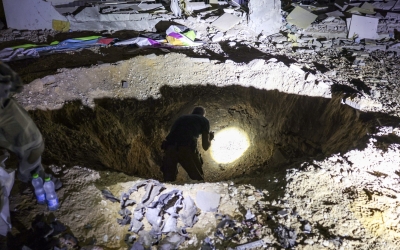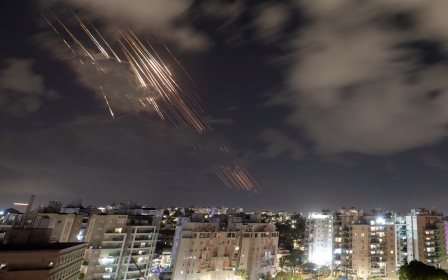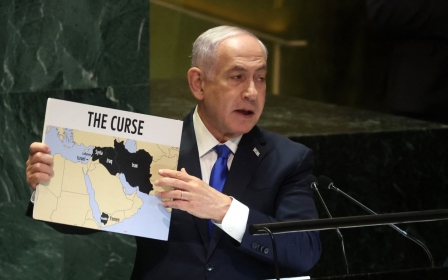'Failure or deception?': Iran missile attack, Israel's Lebanon invasion taint Biden's diplomacy
Hours after Iran launched 180 missiles into Israel on Tuesday, the Biden administration deemed the action “ineffective” and vowed that there would be consequences, despite a continued insistence on avoiding a wider regional war.
But by continuing to lend Israel its full-throated support over the past year both in Gaza and Lebanon, where tens of thousands of people have been killed - and by backing the crippling of Hezbollah’s leadership structure - the US has inadvertently provoked Iran.
Omar Rahman, a fellow with the Middle East Council on Global Affairs, told Middle East Eye the provocation could “likely amount to the outbreak of a very far-reaching and destructive war in the region”.
Iran telegraphed its previous response in April, but US officials this time around have denied reports that Iran had informed them of the attack before it took place.
Rahman said that means Iran has developed a new calculus.
New MEE newsletter: Jerusalem Dispatch
Sign up to get the latest insights and analysis on Israel-Palestine, alongside Turkey Unpacked and other MEE newsletters
“I think what it was intending to do was respond to Israel by attacking it in a way much different than it did in April, in which it choreographed its attacks so that it would be stopped, so that it would not provoke the war,” he said.
“This time, it didn't choreograph it. Some of its missiles got through, some of them were intercepted, and Israel will likely respond.”
On Wednesday, Deputy US Secretary of State Kurt Campbell said it was not just Israel thinking about how to respond, but the US, too.
However, the US has stated from the outset of Israel's war on Gaza that one of its primary goals was to prevent a wider regional conflict. The recent escalations from Iran and Israel come despite a string of failed diplomatic efforts.
Diplomatic failure or deception?
The last year of US diplomacy has been a consistent barrage of mixed messages on Gaza and Lebanon. It has armed Israel unconditionally, and diplomatically supported its military operations in the besieged Strip while maintaining that its primary objective is a ceasefire.
In Lebanon, the US has continued this dual policy of overtly backing Israel's military-first strategy while it says it's in favour of a truce.
“There are two ways of looking at the last 12 months of US diplomacy in the Middle East - either as an abject failure or a deceptive success," Tariq Kenney-Shawa, US policy fellow at al-Shabaka, told Middle East Eye.
Kenney-Shawa said that many may view the US failure to achieve de-escalation as a result of the Biden administration's ineptitude, and that its ideological commitment to Israel has left it unwilling to use leverage to compel Israel to de-escalate.
But there is another way to see it.
"To a certain extent, the US shares Israel’s interests and objectives and has been using flowery human rights rhetoric and 'ceasefire talks' as a way of distracting all parties involved and buying Israel time to carry out its genocide in Gaza, strike heavy blows against its regional adversaries, and re-establish the status quo through brute force."
What brings US sincerity into doubt has been its inability to extract concessions from Israel.
"For months, the US administration has voiced its support for diplomacy and the 'rules-based order' but refused to use US leverage to enforce it," Nancy Okail, president and CEO of the Center for International Policy, told Middle East Eye.
"Today is one of many signs of its failure," Okail added, referring to Israel's ground invasion of Lebanon.
Israel's killing of Hezbollah leader Hassan Nasrallah, its invasion of Lebanon and Iran's strikes on Israel happened in quick succession, a tit-for-tat escalation that has left the international community scrambling for a diplomatic solution.
Matt Duss, executive vice president at the Center for International Policy, said the US is being drawn into a war that imperils its personnel and the region, and stopping it "rests on whether President Biden is finally willing to take the steps necessary – including suspending offensive weapons deliveries – to prevent a horrific conflagration.”
Failure to 'project strength'
Analysts and former government officials told Middle East Eye that this administration simply hasn’t projected enough strength in the region.
“I think strength would be the US stepping up for the interests of peace and being strong enough to engage with all parties, instead of just giving one party everything they wanted and hoping that it wouldn't lead to a crisis,” National Iranian American Council president Jamal Abdi told MEE.
“The racist trope that is frequently used when people talk about the Middle East - this concept that ‘these people only understand power’ - I think could actually be used for this White House,” he added.
Last week, a joint US-France proposal for a 21-day ceasefire between Israel and Lebanon was rebuffed by Israeli Prime Minister Benjamin Netanyahu, much in the same manner that he turned down a number of US-sponsored ceasefire proposals in Gaza over the past year.
During that period, nationwide protests, disruption of political speeches, boisterous student encampments, and resignations from the Biden administration also did not curb US weapons transfers to Israel - something critics see as the most consequential leverage Washington has.
'It’s not even failure by design. This is disingenuous'
- Trita Parsi, Quincy Institute
But suggesting the US president failed in his efforts to prevent violent escalation in Gaza and Lebanon means he was, in fact, trying - not everyone agrees.
"It's not even failure by design. This is disingenuous," Trita Parsi, executive vice president at the Quincy Institute for Responsible Statecraft, told Middle East Eye.
"They've been claiming to favour de-escalation. They've been claiming to favour a ceasefire, and they're essentially asking us not to believe our own eyes when we see them veto resolutions at the UN, when we see them constantly make excuses for Netanyahu when he repeatedly sabotages the talks," he said.
On 30 September, Politico's reporting appeared to confirm what at least one former US defence official had speculated to MEE for a previous story: the Biden administration's envoy, Amos Hochstein, gave Israel the green light to mount large-scale attacks on Hezbollah and southern Lebanon. Hochstein was in Israel 24 hours before the pager explosions that maimed more than 2500 people.
"Are we going to see constant escalation from Israel with US support, every day, up until the elections on November 5? And how much escalation can take place without actually leading to an all-out war? I don't think there's many steps left on the ladder at this point," Parsi told MEE.
Too weak on Iran, too soft on Israel
Those with a far more hawkish view of Iran also said the US president appeared weak.
“Unless and until you are willing to make Iran pay - and I don't mean we have to get into a kinetic war - but unless you hold Iran accountable, nothing is going to change. Iran must feel the pain,” Kirk Lippold, former commanding officer of the warship, USS Cole, told MEE.
That comes from “dropping Iran to its economic knees” through sanctions, followed by a maritime interdiction on the country imposed by western allies. If that fails, Lippold added, the last resort would be military action.
“Take out the drone factories. Take out the ballistic missile engine factories,” he said.
Lieutenant Colonel Anthony Shaffer, a retired army officer and former advisor to the Donald Trump US presidential campaign, told MEE that under Biden, the US “blew it every step of the way”.
“They tried to appease Iran and not be too aggressive,” he said.
“The Biden administration not taking a side, not being definitive, created conditions for the chaos we now see.”
Trump shared similar sentiments at a campaign rally not long after Iran's missile launches on Tuesday.
“The two incompetent people running our country - and I don’t think they’re even running it - are leading us to the brink of World War III, a war like no other," he told his supporters.
While Trump has long assumed a hard line on Iran, Parsi told MEE that the Biden administration may very well be responsible for what becomes a full-scale regional war. On Wednesday, Biden said he would not support an Israeli strike on Iran’s nuclear facilities.
“Previous presidents, including Trump, have halted and sought to prevent that, and successfully prevented that,” Parsi told MEE.
“But the truth is, Israel cannot sustain either its genocide in Gaza or its regional escalations without US military and diplomatic support.”
Middle East Eye delivers independent and unrivalled coverage and analysis of the Middle East, North Africa and beyond. To learn more about republishing this content and the associated fees, please fill out this form. More about MEE can be found here.






